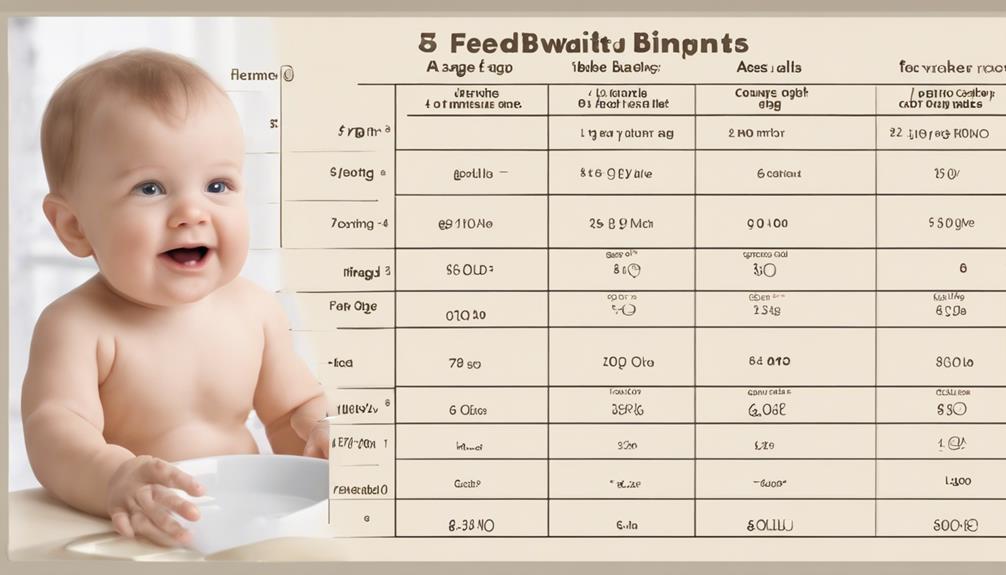Have you ever wondered if there is a foolproof way to ensure your baby is getting the right nutrition from formula milk?
Well, the 'Baby Formula Feeding Chart: a Complete Guide From NHS' might just hold the answers you seek. With expert advice on types of formula, feeding techniques, and precautions to think about, this guide offers a wealth of information for parents.
But what about establishing a feeding schedule or knowing the signs that your baby is satisfied? Let's explore together how this detailed resource can help navigate the world of formula feeding for your little one.
Key Takeaways
- Follow recommended feeding guidelines for baby's health and growth.
- Monitor diaper output, weight gain, and behavior to ensure sufficient formula intake.
- Establish a consistent feeding schedule based on baby's cues and appetite.
- Prepare for feeding away from home with necessary supplies for convenience.
Importance of Following Feeding Recommendations
In ensuring the best health and growth of your baby, it's important to adhere diligently to the recommended feeding guidelines. Meeting your baby's needs through proper feeding practices is essential for their overall well-being. Babies have specific nutritional requirements that must be met to support their healthy development.
By following a consistent feeding schedule and portion sizes, you can help prevent issues like overfeeding, which may lead to digestive discomfort and excessive weight gain. Consistency in feeding not only ensures that your baby gets the right amount of nutrients but also helps establish a routine that supports their growth.
Monitoring your baby's feeding patterns and consulting healthcare professionals for guidance on formula feeding are essential steps in promoting optimal infant health. By following the recommended feeding amounts, you're taking proactive steps to provide your baby with the best possible start in life.
Understanding Recommended Feeding Amounts

Understanding the recommended feeding amounts plays an important role in ensuring your baby receives the necessary nutrition for healthy growth and development. To feed your baby effectively, it's vital to take into account that formula-fed infants typically need between 150-200 ml of formula per kilogram of body weight each day.
Initially, newborns may take in about 60-90 ml per feed during the first few days of life. As your baby grows, both the amount per feed and total daily intake will gradually increase. It's important to heed the advice of healthcare professionals and adjust feeding quantities based on your baby's individual requirements.
Monitoring your baby's weight gain, growth patterns, and overall well-being can guide you in determining whether they're receiving the right amount of formula. Remember, every baby is unique, and their feeding needs may vary, so staying attuned to their cues and development is key to providing adequate nourishment.
Establishing a Feeding Schedule
Making sure your baby is nourished properly involves more than just understanding feeding amounts; it also includes establishing a consistent feeding schedule that aligns with their growing needs.
When setting up a feeding routine for your little one, offering formula every 2-3 hours for newborns is a good starting point. As your baby grows, gradually increase the amount of formula per feeding to meet their developing appetite. It's important to pay attention to your baby's hunger cues to adjust the feeding schedule accordingly.
During the first few weeks, aim for 6-8 feedings per day to make sure they receive the necessary nutrition. Remember to consult with a healthcare provider for personalized guidance on establishing a feeding schedule tailored to your baby's specific requirements.
When preparing formula, always use hot water to mix the formula as per the manufacturer's instructions to make it safe and ready for your little one.
Signs Your Baby Is Getting Enough Formula

To guarantee your baby is receiving enough formula, monitor their diaper output for at least 6-8 wet diapers a day. Weight gain and growth milestones are also good indicators of adequate infant formula intake. Additionally, observing content and satisfied behavior after feeds, regular bowel movements, and a consistent feeding schedule are all positive signs that your baby is getting enough formula. Remember, each baby is unique, so consulting your healthcare provider if you have any concerns about your baby's formula intake or growth is essential.
| Signs Your Baby Is Getting Enough Formula |
|---|
| – 6-8 wet diapers a day |
| – Consistent weight gain and growth |
| – Content and satisfied after feeds |
| – Regular bowel movements |
Tips for Feeding Away From Home
When feeding away from home, it's important to be prepared with the right tools and supplies to guarantee your baby's feeding routine stays consistent and convenient. Here are some tips to help you navigate feeding your little one while on the go:
- Pack pre-measured formula powder in a clean, dry container for easy preparation in public spaces.
- Carry pre-boiled water in a thermos to mix with formula when needed, ensuring safety and convenience.
- Use a formula dispenser to store pre-measured formula servings for quick and mess-free feeding outside the home.
- Remember to bring along extra bottles, nipples, and a bottle brush for cleaning and feeding away from the comfort of your home environment.
Frequently Asked Questions
How Much Formula Should My Baby Have Nhs?
We should aim to feed our baby around 2-3 ounces of formula per feed in the first few weeks, according to NHS guidelines. As they grow, babies usually consume 150-200ml (5-7oz) of formula per kilogram of body weight per day.
Most infants have 6-8 feeds in a 24-hour period, but this can vary based on individual needs. It's important to respond to our baby's hunger cues and adjust feeding amounts accordingly for their best growth and development.
How Much Formula Should a Baby Drink Chart?
When determining how much formula a baby should drink, several factors should be considered, including age, weight, and individual needs.
Newborns typically start with 2-3 ounces per feeding, gradually increasing as they grow. By the time a baby is 1 month old, they may consume 4-5 ounces per feeding. From 2-6 months of age, babies might have 4-6 ounces per feeding, totaling 24-36 ounces daily.
For infants aged 6-12 months, the amount of formula they drink may increase to 6-8 ounces per feeding, totaling around 24-32 ounces daily.
How Do I Calculate Formula Feeding for My Baby?
We calculate formula feeding for our baby by multiplying their weight in pounds by 2.5 to 3 ounces to determine their total daily intake. Then, divide this by the number of feedings in 24 hours to find the amount per feeding.
For instance, a 10-pound baby might need 25-30 ounces per day, spread across 6-8 feedings. We adjust this amount according to hunger cues, growth spurts, and advice from our pediatrician, while closely monitoring weight gain, diaper output, and overall satisfaction.
What Is the Feeding Schedule for Formula Babies?
Rest assured, the feeding schedule for formula babies is well taken care of! Typically, formula-fed little ones require feeding every 2-3 hours, totaling 8-10 feedings daily.
Newborns usually consume 2-3 ounces per feed, adjusting as they grow. As your baby matures, they may intake more per feeding and go longer between feeds.
Always pay attention to their hunger cues and seek guidance from your healthcare provider for personalized advice. Your baby's needs are our top priority!
Conclusion
As we wrap up this guide on formula feeding, remember: when in doubt, always consult a professional.
It's ironic how something as simple as feeding can feel so overwhelming, but trust me, you've got this!
Keep following the recommendations, stay attentive to your baby's cues, and don't forget to enjoy those precious feeding moments.
Remember, you're not just feeding a baby, you're nourishing a future foodie!
Cheers to happy and healthy feeding adventures ahead.









